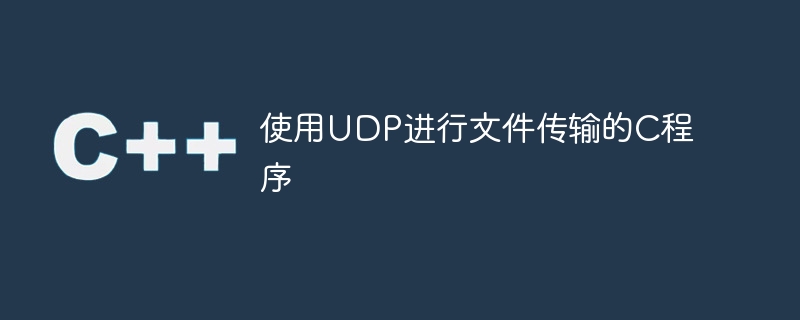
数据可以在两台使用 C 语言实现 Socket 编程的计算机之间传输。
在同样的情况下,可以轻松地通过实现用户数据报协议 (UDP) 和 简单的客户端/服务器。
安全性 - 通过加密处理。
协议 - UDP
加密 - 异或加密
服务器启动并等待文件名。
客户端发送文件名。
该文件名由服务器接收。如果文件存在,服务器开始读取文件,并继续发送一个填充有加密文件内容的缓冲区,直到到达文件末尾。
文件结尾标记为EOF。
文件将作为缓冲区接收,直到且除非收到 EOF。之后对其进行加密。
如果文件不存在,则会发送一条消息“找不到文件”。
// server code for UDP socket programming
#include <arpa/inet.h>
#include <netinet/in.h>
#include <stdio.h>
#include <stdlib.h>
#include <string.h>
#include <sys/socket.h>
#include <sys/types.h>
#include <unistd.h>
#define IP_Protocol 0
#define Port_No 15050
#define Net_Buf_Size 32
#define CipherKey 'S'
#define SendRecvFlag 0
#define NoFile "File Not Found!"
// function for clearing buffer
void clearBuf(char* b1){
int i;
for (i = 0; i < Net_Buf_Size; i++)
b1[i] = '\0';
}
// function for encryption method
char Cipher(char ch1){
return ch1 ^ CipherKey;
}
// function for sending file
int sendFile(FILE* fp1, char* buf1, int s1){
int i, len;
if (fp1 == NULL) {
strcpy(buf1, NoFile);
len = strlen(NoFile);
buf1[len] = EOF;
for (i = 0; i <= len; i++)
buf1[i] = Cipher(buf1[i]);
return 1;
}
char ch1, ch2;
for (i = 0; i < s1; i++) {
ch1= fgetc(fp);
ch2 = Cipher(ch1);
buf1[i] = ch2;
if (ch1 == EOF)
return 1;
}
return 0;
}
// driver code
int main(){
int sockfd1, nBytes;
struct sockaddr_in addr_con;
int addrlen = sizeof(addr_con);
addr_con.sin_family = AF_INET;
addr_con.sin_port = htons(Port_No);
addr_con.sin_addr.s_addr = INADDR_ANY;
char net_buf1[Net_Buf_Size];
FILE* fp1;
// socket()
sockfd1 = socket(AF_INET, SOCK_DGRAM, IP_Protocol);
if (sockfd1 < 0)
printf("</p><p>file descriptor is not received!!</p><p>");
else
printf("</p><p>file descriptor %d is received</p><p>", sockfd1);
// bind()
if (bind(sockfd1, (struct sockaddr*)&addr_con,
sizeof(addr_con)) == 0)
printf("</p><p>Successfully is binded!</p><p>");
else
printf("</p><p>Binding is Failed!</p><p>");
while (1) {
printf("</p><p>Waiting for name of file...</p><p>");
// receive name of file
clearBuf(net_buf1);
nBytes = recvfrom(sockfd1, net_buf1,
Net_Buf_Size, SendRecvFlag,
(struct sockaddr*)&addr_con,
&addrlen);
fp1 = fopen(net_buf1, "r");
printf("</p><p>File Name is Received: %s</p><p>", net_buf1);
if (fp1 == NULL)
printf("</p><p>File open is failed!</p><p>");
else
printf("</p><p>File Successfully is opened!</p><p>");
while (1) {
// process
if (sendFile(fp1, net_buf1, Net_Buf_Size)) {
sendto(sockfd1, net_buf1, Net_Buf_Size,
SendRecvFlag,
(struct sockaddr*)&addr_con,
addrlen);
break;
}
// send
sendto(sockfd1, net_buf1, Net_Buf_Size,
SendRecvFlag,
(struct sockaddr*)&addr_con, addrlen);
clearBuf(net_buf1);
}
if (fp1 != NULL)
fclose(fp1);
}
return 0;
}
// client code for UDP socket programming
#include <arpa/inet.h>
#include <netinet/in.h>
#include <stdio.h>
#include <stdlib.h>
#include <string.h>
#include <sys/socket.h>
#include <sys/types.h>
#include <unistd.h>
#define IP_Protocol 0
#define IP_Address "127.0.0.1" // localhost
#define Port_No 15050
#define Net_Buf_Size 32
#define CipherKey 'S'
#define SendRecvFlag 0
// function for clearing buffer
void clearBuf(char* b1){
int i;
for (i = 0; i < Net_Buf_Size; i++)
b1[i] = '\0';
}
// function for decryption method
char Cipher(char ch1){
return ch1 ^ CipherKey;
}
// function for receiveing file
int recvFile(char* buf1, int s1)
{
int i;
char ch1;
for (i = 0; i < s1; i++) {
ch1 = buf1[i];
ch1 = Cipher(ch1);
if (ch1 == EOF)
return 1;
else
printf("%c", ch1);
}
return 0;
}
// driver code
int main(){
int sockfd1, nBytes;
struct sockaddr_in addr_con;
int addrlen = sizeof(addr_con);
addr_con.sin_family = AF_INET;
addr_con.sin_port = htons(Port_No);
addr_con.sin_addr.s_addr = inet_addr(IP_Address);
char net_buf1[Net_Buf_Size];
FILE* fp1;
// socket()
sockfd1 = socket(AF_INET, SOCK_DGRAM,
IP_Protocol);
if (sockfd1 < 0)
printf("</p><p>file descriptor is not received!!</p><p>");
else
printf("</p><p>file descriptor %d is received</p><p>", sockfd1);
while (1) {
printf("</p><p>Please enter the name of file to receive:</p><p>");
scanf("%s", net_buf1);
sendto(sockfd1, net_buf1, Net_Buf_Size,
SendRecvFlag, (struct sockaddr*)&addr_con,
addrlen);
printf("</p><p>---------Data is Received---------</p><p>");
while (1) {
// receive
clearBuf(net_buf1);
nBytes = recvfrom(sockfd1, net_buf1, Net_Buf_Size,
SendRecvFlag, (struct
sockaddr*)&addr_con,
&addrlen);
// process
if (recvFile(net_buf1, Net_Buf_Size)) {
break;
}
}
printf("</p><p>-------------------------------</p><p>");
}
return 0;
}위 내용은 UDP를 이용한 파일 전송을 위한 C 프로그램의 상세 내용입니다. 자세한 내용은 PHP 중국어 웹사이트의 기타 관련 기사를 참조하세요!